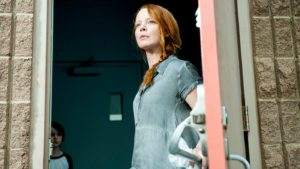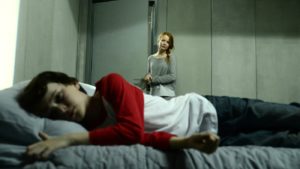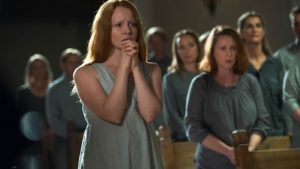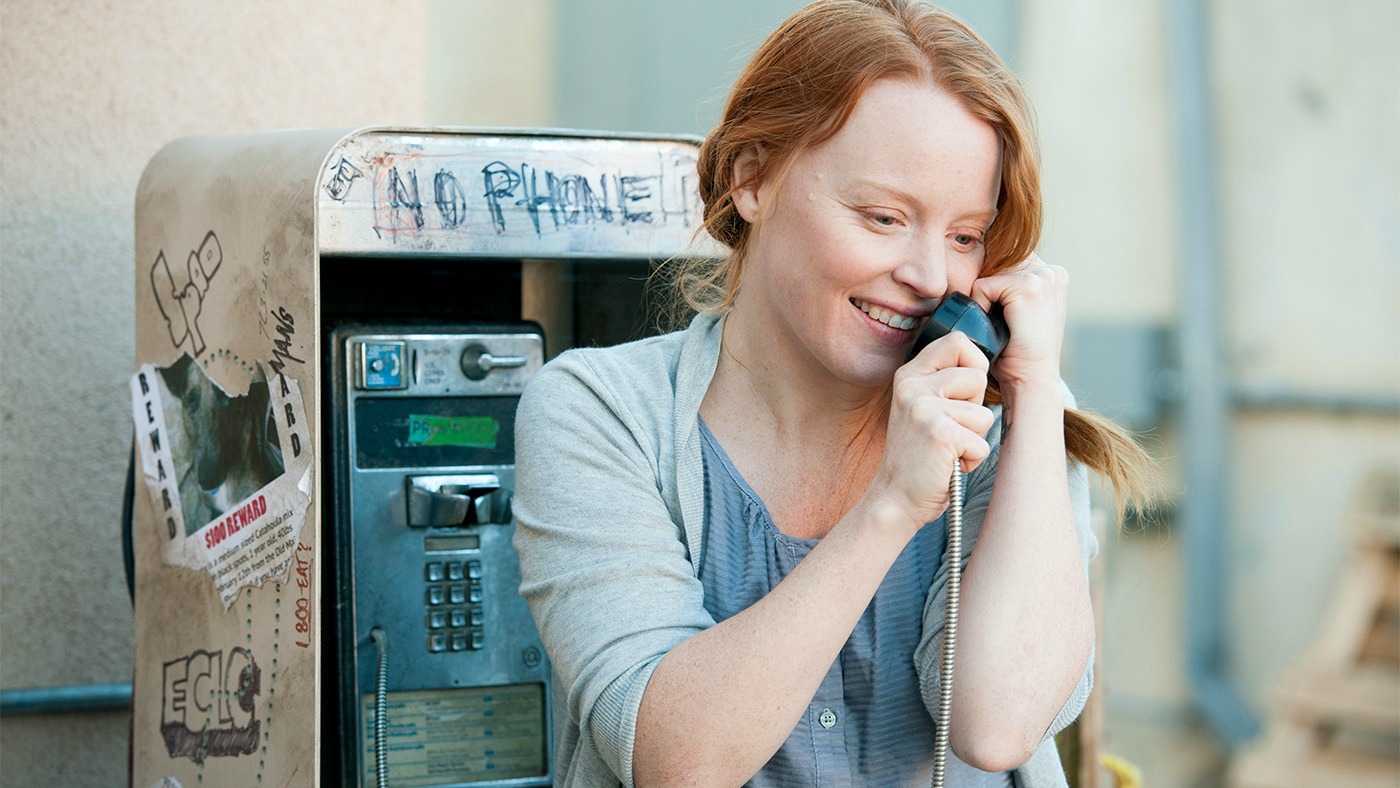**WARNING: The following interview contains major spoilers for the April 23 episode of “Dig.” Read at your own risk.**
Actress Lauren Ambrose has plenty of experience confronting death in her work. After five seasons portraying Claire Fisher, the rebellious daughter within a family of morticians on HBO’s acclaimed “Six Feet Under,” it seems hard to believe the Emmy nominee and SAG Award winner would be shocked about any character’s grisly outcome.
Yet Thursday’s episode of “Dig,” USA’s event series on which Ambrose co-stars as escaped cult member and truth-seeker Debbie Morgan, brought her arc to an abrupt and brutal end that would likely throw even the Fishers for a loop. Viewers have watched Debbie evolve from timid follower to fearless avenger in a matter of mere weeks, only to witness her journey be cut short at the hands of the very person for whom she’d risked everything to protect.
Ambrose talked with The Workprint about her preparation for Debbie’s departure, why “Dig” provided the ideal creative environment for any storyteller looking to present a fully-realized and complex idea, and the “creepfest” involved in having a 13-year-old slash her throat on set — or at least pretend to.

Debbie’s had arguably the most profound character transition of anyone on the show. It’s what makes her death all the more tragic: watching her go from this indoctrinated acolyte to this fierce, independent thinker searching for her freedom, and also learning a little bit about her painful past. How did you react when you found out how her story would ultimately end?
Well, it wasn’t entirely a surprise, because the reason I could do the job because I knew it was only eight episodes. So, I knew I was going to leave in some way and that I was going to die, and I guess I even knew that Josh was going to kill me, because I talked to Gideon [Raff, series creator] about it at the beginning of the whole arc. Actually, that was one of the reasons I loved this job was because I think almost all of the scripts were written before we even started filming. That, to me, is just how it should be done. There was no making thing up as they went. They really knew this story they were telling, and that was very satisfying to work that way. But when I did find out, they had kind of kept it hidden from me for a while and I think it was also to protect Zen [McGrath], who was playing Josh. So when we both found out, I was just immediately worried about Zen because, you know, I’m a mother, and he was really upset about it.
That must have been a difficult scene for him, for sure.
Yeah. He really didn’t know it was coming, he didn’t know he was going to kill me, and I think when he found out how, he was really, truly horrified.
It was definitely disturbing to watch a kid do something like that, especially when Josh served as such an important figure for Debbie. It was a very maternal relationship for her.
I know! I know it. I’d never filmed a death scene before, so this was a little bit of a creepfest for me as well, especially in such a manner. I’m a singer, and I always have things about my throat and my neck, and we were doing this prosthetic on the neck, and it was kind of freaking me out a little bit. So, Zen and I, we decided to just focus on the movie magic aspect of it — that we can do things like this, and they can tell the story and all of the technical stuff. That was our intent and our focus for the day [chuckles].
That sounds like a plan. Debbie was really only on the tip of the iceberg in terms of the larger conspiracy the show is exploring, but for her personal story she was so close to achieving the freedom she was seeking. Watching her meet her demise at this point in the show was really heartbreaking to see, but you’d mentioned talking to Tim, Gideon and the other writers about what was going to happen. How did you rationalize or justify the need to kill Debbie for the sake of the story progression? Was it for the greater good of the narrative?

Well, again, it was one of those things where I wouldn’t have been able to do the job if I had to be on the show any longer [laughs]. I was beholden to another thing, so in that sense I was very grateful that it was an eight-episode arc. I knew that, and that’s why I was able to do it and I knew what I was getting into. But in terms of the story, it’s kind of great, because she fulfilled this transformation. She wakes up out of this dream state that she’s in, and starts to see what’s really going on and is the only person around her who does. She goes so far with it and decides not just to save herself, which is this very compassionate, wonderful thing, but she chooses, I guess mistakenly, to try to change this kid who, perhaps, she feels is a little less “formed” than he really is, because he’s actually quite sociopathic.
Yes. He’s actually manufactured that way, if you think about it.
Yes, exactly. He’s the second one. He’s the second Josh. The first one was raised by Debbie, and the second one was maybe raised by Faye in a much less compassionate, less loving way — just a different person. But I think when Debbie dies, it’s in a very peaceful moment, in that she’s not only destroyed this thing she feels is evil, or at least thinks she has, and she’s able to turn her thoughts to a higher place, to a more spiritual realm and actually consider what she really believes in. So, I think in terms of the writing that’s a really cool moment to say this person’s story is over, because she’s sort of gotten to a higher level and now it’s okay. We can say goodbye.
Absolutely. Ironically, leaving the cult is how Debbie finally achieved the enlightenment and new plane of existence she was looking for.
Right. I love all the metaphors in there, with needing to wake up out of the dream you’re in to be able to really see it and consider what you actually believe in. And I think that stuff was really fun to play and tell the story of.
It must have given you a lot to think about. You touched on this earlier, but television really is evolving more toward anthology or finite formats, and that structure does seem to appeal to actors looking for ways to diversify their work without the possibility of committing to multiple seasons. You mentioned how “Dig” appealed to you in that way because you knew it would only be eight episodes. Do you think that limited framework helps condense and expedite the storytelling process more efficiently? “Six Feet Under” pulled off one of the greatest series finales in history after five seasons, but that’s rare. A lot of shows, especially ones like “Dig” with layers of mystery and existential themes, tend to unravel a bit by the time they’re finally ready to start wrapping, despite showrunners’ claims they know what they’re doing all along. But in this case, there really was a game plan from beginning to end.
Yeah, I think that’s bullshit. I don’t think they ever know what they’re doing all along [laughs]. I mean, maybe they have the end in sight, but there’s always those middle years. It’s probably not as good for actors who potentially just go on and on with something, but in terms of the storytelling I think it’s really great, especially on television when you could go on and on, it’s great to have a really clear thesis and stick to it, and know where you’re going. In terms of the whole piece, and the palettes of color choices and filming, and of course the relationships of the characters and how they intersect, that’s what was really satisfying to work in that way, and to be there to help bring this very clear [idea]. Gideon Raff wrote so much of it and pitched the whole thing to me, and I think they had most of the episodes written before we even started.
That’s reassuring, isn’t it?
Yeah, it’s like this big, long movie. And Gideon directed so many of them, for various reasons – he ended up having to step in after we had some tragedies happen – and he just had such a clear vision and such a strong directing style and really made these bold choices. I was psyched to help bring it to life. That’s such a dream, to be working with somebody who really knows what they want to do and is so prepared. Usually, television moves so quickly that it’s hard to be in that place of preparedness, but this had a feeling of authorship and that we were all working on something that was really considered. That was rare, in my experience, and a really lovely way of working. So I’m all for that. My favorite things are sort of finite, like the British “The Office” or “True Detective.” So wonderful.

Great. Something else I’ve noticed “Dig” adopts that I find rare in most shows is a host of compelling female characters with depth, direction and actual purpose in the narrative. Besides Debbie’s incredible journey, we have Emma’s resurfacing and contribution to the investigation, Lynn finally getting to the bottom of the corruption within the consulate, and even the ambassador, despite her ill intentions, it’s really cool to see a woman as a truly powerful and intimidating villain. It’s refreshing to watch a show avoid featuring just “the girl,” which happens so often – even these days. Was that something that attracted you to the project as well, or what was it about Debbie herself that spoke to you?
You know, I didn’t even know the storylines of all the other people, really. I just talked to Gideon about this character because he asked me to play her and I heard his ideas and where it was going to go. I said, “You’re going to give me something really cool to do, right?” [laughs] and he was like, “Oh, yeah. You’re going to be badass.” … It was really very cool to have a woman who has this big transformation.
Definitely. I loved the scene in the pawn shop, especially, when Debbie says, “I’m going to need a little more protection than that.”
Yeah. We’re gonna need a bigger boat. Totally.
Did you expect Debbie’s transformation to end so gruesomely? Or do you agree it was an oddly peaceful send-off? Sound off in our comment section, and stick with @TheWorkprint for all your pop culture needs!
“Dig” airs Thursday nights at 10/9c on USA.
Follow Erin on Twitter: @ErinBiglow




